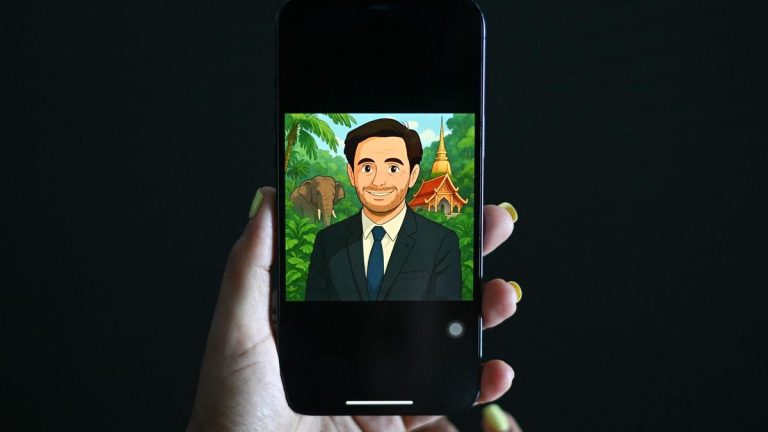
Representative images
| Photo Credit: AFP
In Studio Ghibli’s 2013 film The Wind Rises, set in Japan during the Second World War, a crowd scene lasts a few seconds. There are people jostling, goods being transported, a mother carrying two babies, everyone in a tearing hurry to get away. Under the direction of Hayao Miyazaki, who co-founded Studio Ghibli in 1985 with Isao Takahata and others, it took animators more than a year to hand-draw the frames. Miyazaki ensured that no computer graphics were used, for a crowd is not faceless, it is what society is made of, and catching the expression of each person was important.
Last week, ChatGPT showed off its latest image generating capabilities, allowing users to create Studio Ghibli-like images in a flash. Social media was flooded by AI-generated memes and art, seemingly mocking the painstaking years-long process that Japan’s famed animation studio has put in behind each film. This frenzy has triggered a debate on whether AI, which can replicate art, will ever be able to catch its nuances.

Studio Ghibli has been making animation films with images built from tens of thousands of hand drawings. It has 24 animated features to its name; the first, Nausicaä of the Valley of the Wind, about a warrior and a peace-maker who struggle to stop war, was released just before the studio’s official founding. Early classics include My Neighbour Totoro (1988), the story of two girls and their tryst with forest spirits, and Princess Mononoke (1997), a girl raised by wolves and her battle with society.
Emotionally immersed in local milieu, the 84-year-old Miyazaki’s rich atmospheric, acutely observed work has led to international acclaim too. Miyazaki has got two Oscar nods, for The Boy and the Heron last year — he came out of retirement to make the film — and for the magical Spirited Away in 2003, in which 10-year-old Chihiro meets a masked spirit and hopes to rescue her parents from a curse.

In her book, Miyazakiworld: A Life in Art, Susan Napier writes that Miyazaki, born in war-torn Japan, is sensitive to technological and environmental catastrophe, but that his world adds up to more than apocalypse, female protagonists, and elegiac and utopian visions. “His interweaving of all these elements in an emotionally resonant tapestry makes him an exceptional world builder — like other fantastists Lewis Carroll, Jules Verne, J.R.R. Tolkien and J.K. Rowling,” she contends.
‘Trauma is universal’
In interviews, Miyazaki has said trauma (war, ruin and his mother’s tuberculosis influenced his worldview) is universal, “the kind of thing everyone has — whether you carry it along carefully or try to sublimate it into other forms”. But rather than dwell on trauma, Miyazaki pushes for the values of perseverance, resilience, endurance and acceptance in his films.
Napier calls Miyazaki an idiosyncratic genius. The workplace is intense and she quotes Miyazaki describing the frenzied realm of the bathhouse in Spirited Away as being modelled on Studio Ghibli, with the cantankerous witch Yubaba, the bathhouse head, serving as a hybrid of himself and producer Toshio Suzuki.

Though Miyazaki has not commented on the AI controversy, in the past, he derided attempts to produce art through machines. Watching an AI model of a figure grotesquely moving on the floor, he said he never wanted to incorporate this technology because it did not understand human behaviour. In the days to come, AI overreach, copyright issues, exploitation of artists and creative legacy will be hotly debated.
Machines can never be allowed to take control of society, Geoffrey Hinton, who pioneered AI, had cautioned. Days before ChatGPT’s onslaught, Miyazaki’s son, Goro Miyazaki, Studio Ghibli’s managing director, told the media that it was a possibility that AI could one day replace animators, but “whether audiences would want to watch a fully AI-generated animation is another matter”. Even if old school and new tech collide, viewers will hope Miyazaki and other artists never have to put their pencil down.
Published – April 06, 2025 01:50 am IST

